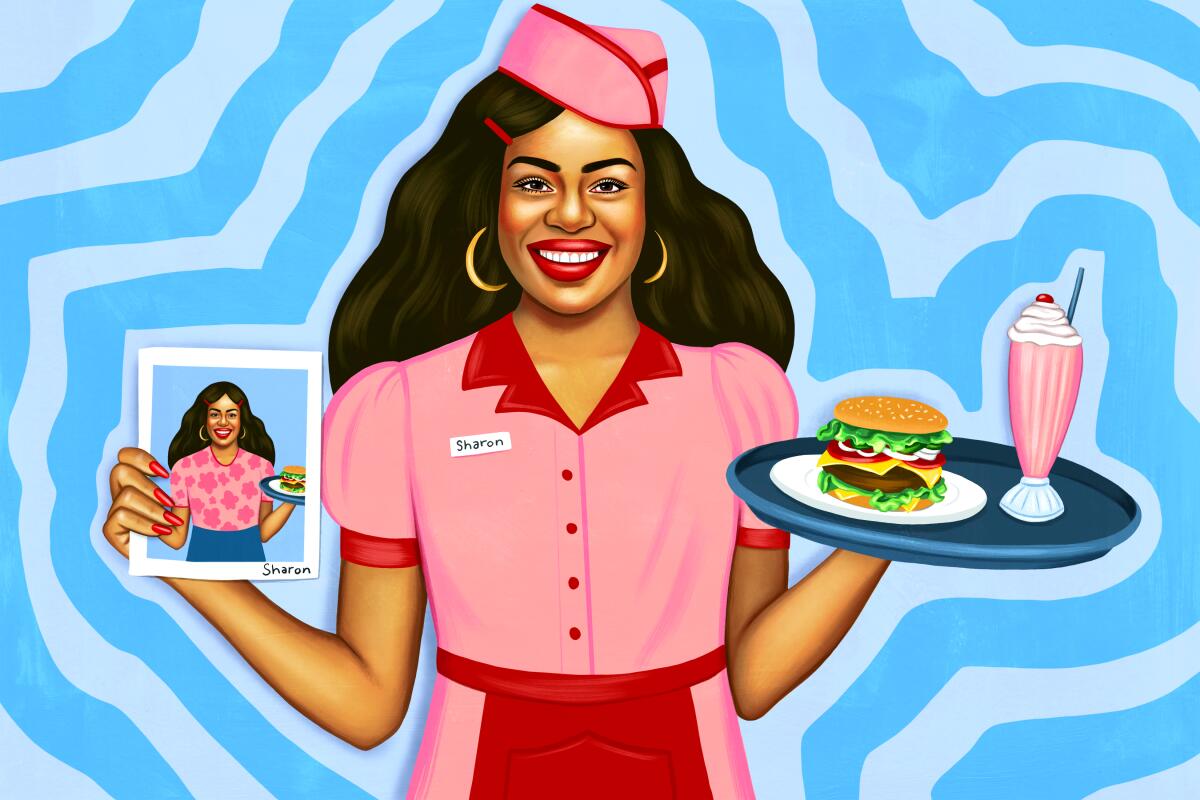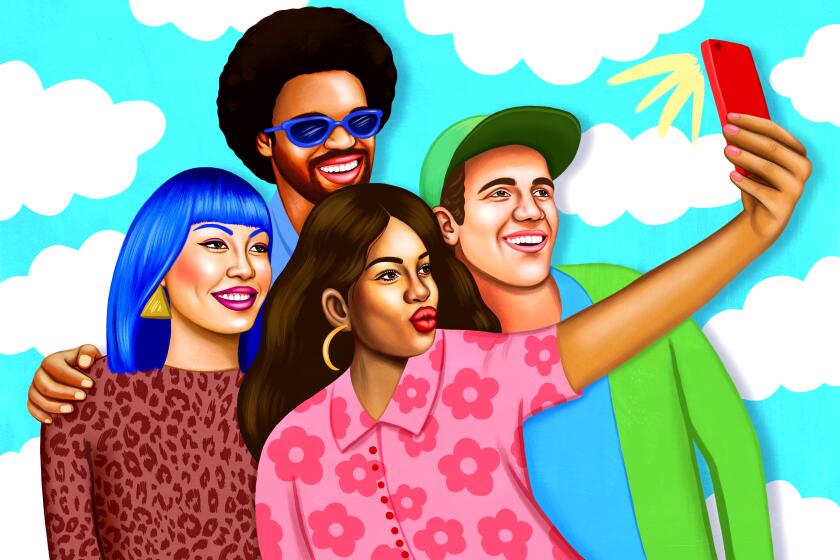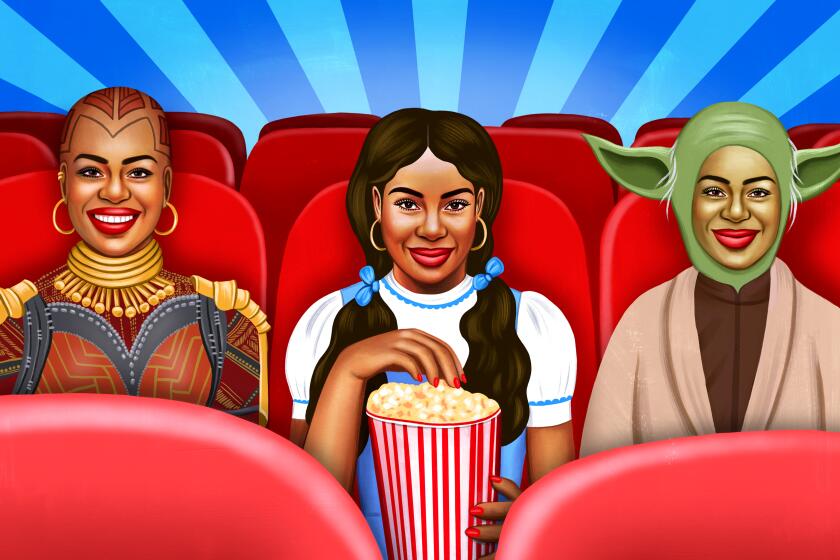How to pay your bills when you’re starting out in Hollywood

- Share via
James Tang has been a host at a restaurant and worked at a pop-up food stall. He was previously an assistant to a talent manager. He’s done algorithm training for tech companies and audio transcription. He’s even had a job as a warehouse assistant for a children’s science education company. Most recently, he’s been streaming on Twitch and collecting tips and other micro-donations from his growing fanbase.
He’s a working actor in Hollywood.
The stereotype in L.A. is that every server in a restaurant has a headshot or a screenplay. Pre-pandemic, the service industry typically attracted people in entertainment because of the flexibility. But working in a restaurant isn’t your only option if you’re starting out in Hollywood and looking for a day job.
Tang has been in Los Angeles for about seven years. His highest-profile credits include small roles on “Brooklyn Nine-Nine” and “NCIS: Los Angeles,” and he’s a love interest in the web series “Love in 2020.” He has an agent, he signed with a new manager in December, and now that the pandemic has made self-taped auditions just as acceptable as in-person ones, he’s getting more opportunities than ever. But even as someone who had patches of parental support when he was younger, he was barely scraping by before the pandemic, and he applied for unemployment benefits.
“It’s so easy to get stars in your eyes,” he said. “That’s why people come to Hollywood to try to make it. There’s that myth that you could get discovered at the bakery or something by a random person, but honestly, it doesn’t really happen like that.”
Actors often start out as day performers with small roles called co-stars, he explained, which, according to SAG-AFTRA, pay about $1,000 a day. If you’re lucky, that role might be a scene that takes four days to shoot. If you’re extra lucky, you might book four of those in one year. That would add up to about $16,000.
“Knowing those numbers now, in order to be an actor, you have to also not be an actor to be able to survive,” he said. “To pay for classes, network, go to events, get headshots, set up a website, all these little marketing things.”
Those who are successful in Hollywood will often say it’s hard to give concrete advice because there isn’t a singular path to success. It’s a gig economy. The rules are loose and ever-changing. Someone who was your intern could be your boss in five years.
But for many, it takes years to get yourself to a place where you are making money from your creative work. If you don’t come from wealth, how do you survive in the meantime?
Actors have to do a little behind-the-camera work for auditions these days. Don’t worry — creating your self-tape audition is not as hard as it seems.
Side jobs
“The job has to be easy and something you can drop at any moment when someone calls you at 8 p.m. the night before and asks if you can come work at 4 a.m. the next day,” said Trang Ada Trinh, a makeup artist who started as a production assistant.
In the restaurant industry, you can easily swap shifts last minute. You can work nights, keeping your days open for auditions or gigs.
Stephen Colbert, Constance Wu, Kristen Wiig and numerous others worked as waiters for years.
The rideshare industry — Lyft and Uber — has also become a common side job for those hustling in Hollywood. According to data Lyft collected in 2014, 70% of their drivers work or aspire to work in entertainment industry.
It’s also helpful that there are minimal requirements to start driving and you can easily control your schedule. You earn more money if you drive during busier hours. And if you don’t have a car, delivering food through Uber Eats by bicycle or scooter is also an option.
Trinh, who moved to Los Angeles from Boston only knowing one other person in the industry, first worked at a nail salon.
“There were dozens of us [who could cover each other’s shifts], and they understood how the film industry worked,” she said.
She eventually decided she wanted to work in makeup, which required going to beauty school and working as a production assistant on the weekend. She lived out of her car for three months to save up for a down payment for a new place.
“People are like, ‘I can’t believe you lived out of your car,’ but so many people do that, it’s almost normal,” she said. “L.A. is expensive.”
After over a decade in the industry, she’s headed makeup departments for digital media companies and now works on Netflix shows.
But she’s also found ways to generate extra income. She created a men’s grooming line, Guise Etiquette, after she found her clients liked the organic products she was mixing in her bedroom. She opened and later sold a nail salon specializing in crystal-infused beauty services. Now, she’s back in school to become a health and wellness coach.
“The thing that I love and hate about the industry is that you never know when you’re going to work,” she said. “So whatever you can make on the side is helpful. We’re like little squirrels gathering acorns.”
Rejection and uncertainty are part of working in Hollywood, but joy, creativity and fun can be too. Here’s how to manage your mental health.
Hollywood as your side hustle
Some newcomers dive head-first into the entertainment industry, while finding side jobs to pay the bills. Others start with a stable day job, and entertainment is their side hustle until they can build enough momentum to transition into entertainment full-time.
Sarah Cooper, who gained fame with her viral Donald Trump lip syncs on TikTok and released her Netflix special, “Sarah Cooper: Everything’s Fine” last year, worked at Google. Ava DuVernay was working at her entertainment PR agency while developing her first independent films.
Kendall Kyndall, the host of ALLBLK’s “Social Society” and an actor on BET’s “Games People Play,” has one of those Hollywood success stories that sounds dreamlike on paper.
He was working in human resources in Michigan when he started posting comedic, 15-second “Love and Hip Hop” videos to Instagram each week.
At first, he had hundreds of followers, then thousands. After a year, he had a million. Soon, he landed hosting gigs for BET, VH1 and TNT.
One day, his boss pulled him into her office, and he thought he was about to get fired. But she had seen him on the BET Awards and could tell that he wasn’t meant to stay in HR. She wanted to work out a smooth transition for his inevitable departure.
A lot of people back home were saying you need to go to L.A., you need to quit your job. And yes, I did quit my job, but I made a plan.
— Kendall Kyndall
“A lot of people back home were saying you need to go to L.A., you need to quit your job,” he said. “And yes, I did quit my job, but I made a plan. I always say: If you fail to plan, you are planning to fail.”
He was nervous about losing a steady income and benefits, but by the time he moved, he had savings, hosting gigs and brand deals that would support him for at least a year and a half as he went to acting school and auditioned.
“I was still budgeting as if I didn’t have any money,” he said. “Any money I got from these events or networks, I was saving it. Because I knew how I wanted to live in L.A. and how much it’d cost.”
He often hears people say that they just packed up everything and moved to L.A. But he doesn’t recommend that.
“It took too much for me to get out here, and I didn’t want to have to say I failed,” he said. “So set yourself up first, and then go for it.”
The first step in your Hollywood career shouldn’t be paying L.A. rent. Here’s how to take your first steps toward a career in the entertainment industry, according to experts.
Starting from the bottom, but strategically
Ben Lopez, a filmmaker and the executive director of the National Assn. of Latino Independent Producers, sees a lot of people working in Hollywood in jobs that are adjacent to what they actually want to do.
He calls it the “Good Will Hunting” strategy, where you hope that if you work as a janitor at Harvard, and you’re in proximity to the movers and shakers, your talent will get discovered.
And that does happen. Antwone Fisher was a security guard at Sony before Denzel Washington directed his autobiographical script. Ozzie Areu started as a security guard at Warner Bros. and eventually became personal assistant to Brad Pitt and Ellen DeGeneres. Then he worked for Tyler Perry, who encouraged him to open Areu Studios, now one of the nation’s largest Latino-owned-and-operated film studios.
But Lopez, who works with up-and-comers, tells young people not to leave it up to chance. He tells them to be strategic and do their research.
If you want to be a creative executive, who are the people you want to work for — or be like — in the future? Don’t just know who Ryan Murphy is, but know who is part of the team that works with him. What are the companies that have the resources to get their projects made?
“People apply everywhere hoping they’ll get in somewhere, but make it targeted so you’re not wasting years and years looking for that right job and opportunity,” Lopez said.
If you want to be a producer, for example, instead of being at a major Hollywood studio doing an accounting job that’s not getting you on the right track, it might make more sense to find a media job at a tech company or an athlete’s production company where you’re gaining the right skills for the job you want.
Whatever you choose, keep your eye on the dream, he said. Sometimes when people get too successful in day jobs that offer comfort, money and security, it’s harder to quit, Lopez said.
“My dad, who’s a serial entrepreneur, is always like, ‘Why don’t you try doing this as a business so that you can make a lot of money, and then you don’t even have to make the movies, you can just hire people to make them?’” said Tang. “And I’m like, ‘No, I actually want to make the movies. I want the artistic side.’”
What does a TV writer do? How do you become one? How do you move up? How much money can you make? The L.A. Times is explaining the entertainment industry — here’s what you need to know about being a TV writer.
Build a social media community and monetize it
When the pandemic struck — and auditions, service-industry work and social gatherings disappeared — Tang spent a lot of time playing video games with his fellow actor friends.
They decided to start streaming and research how to monetize on Twitch. They soon learned it wasn’t quite as easy as getting paid for playing video games. On Twitch, for example, you have to hit certain audience benchmarks before you can apply to be a partner, which comes with storage, financial support and ability for fans to subscribe. You can also make money from ads, sponsorships or donations from subscribers — though half the cut goes to Twitch. There are tip jars and “bits,” virtual goods that fans can buy to cheer you on.
Tang has been streaming for several hours a day, with the understanding that those who make money on Twitch do this full-time, and that it can take years of consistent output before you start seeing meaningful financial rewards.
This isn’t a backup plan, but a way to have a day job that might connect to your bigger ambitions.
“It’s hard, and it definitely takes time to build a community,” said Kerri Pollard, the chief revenue officer of Patreon. “But it’s also not a flash in the pan either.”
Patreon is a membership service that helps creators get paid directly from their fans, or patrons.
“It’s not one piece of content, one song going viral, it’s a group of people loving what you do and wanting to have that intimate connection, exclusive experience or access,” she said. “It’s about finding your most loyal fans, and those are the ones that stand the test of time.”
Kyndall said many people are concerned with the number of followers they have, but it’s more important to interact with your fans.
“I did not have 1 million followers when I started getting brand deals,” he said. “I had like 300,000 followers, but the engagement was so high.”
Pollard said it also takes time to find your product and market fit. That means that you build a specific product and try to fit within a target market repeatably and predictably. You really need to understand: Who are you making content for? What is resonating? How do you take that kernel, build it and monetize it, so you can continue working as a creative?
Once Kyndall had built a loyal following, he learned to be particular with the brands he chose to work with. Hair product collaborations made sense because he talked about hair all the time in his “Love and Hip Hop” videos. Now he has a “Bestfran” sneaker with Legacy Lapels, inspired by the term he calls his followers.
“Think about it not just as something to pay the bills while you’re trying to break in, but as, ‘I’m going to start building this community,’” said Pollard. “‘If I make it big in entertainment, it’ll continue to grow and thrive with me.’”
Patreon’s most high-profile success story is likely Issa Rae, who monetized on Patreon for her web series, “The Misadventures of Awkward Black Girl,” before she created “Insecure” on HBO. Now, her HOORAE Patreon page is dedicated to supporting other Black creators and funding their projects.
Careers in the entertainment industry can be mysterious for those just starting out, and even for those working in the business. The Los Angeles Times brings you explainers and advice for starting and building your career in Hollywood.
Other examples include actress ThatChickAngel, who has an active Patreon community for her family-related content; Keith Knight, who started by creating weekly comic strips but last year released his comedy “Woke” for Hulu; and the Try Guys, who were able to start an independent media company with the help of their fans from their successful Buzzfeed series.
“Whether you’re at the beginning of your entertainment career or the middle of it, that’s the future,” said Pollard. “To be able to build your community directly on your own terms.”
For a long time, Tang said he felt internal conflict about the other jobs he was doing to make money. He’d think, “But I’m an actor. I should be doing acting work.”
But now he calls his identity struggle a “weird, stubborn idealistic pride.”
“It’s basically like starting a small business,” he said. “I think people don’t necessarily realize that, and sometimes people refuse to acknowledge it even while being out here, because they’re trying to keep it purely about the art.”
Read more of The Times’ guide to working in Hollywood.
More to Read
Inside the business of entertainment
The Wide Shot brings you news, analysis and insights on everything from streaming wars to production — and what it all means for the future.
You may occasionally receive promotional content from the Los Angeles Times.
















